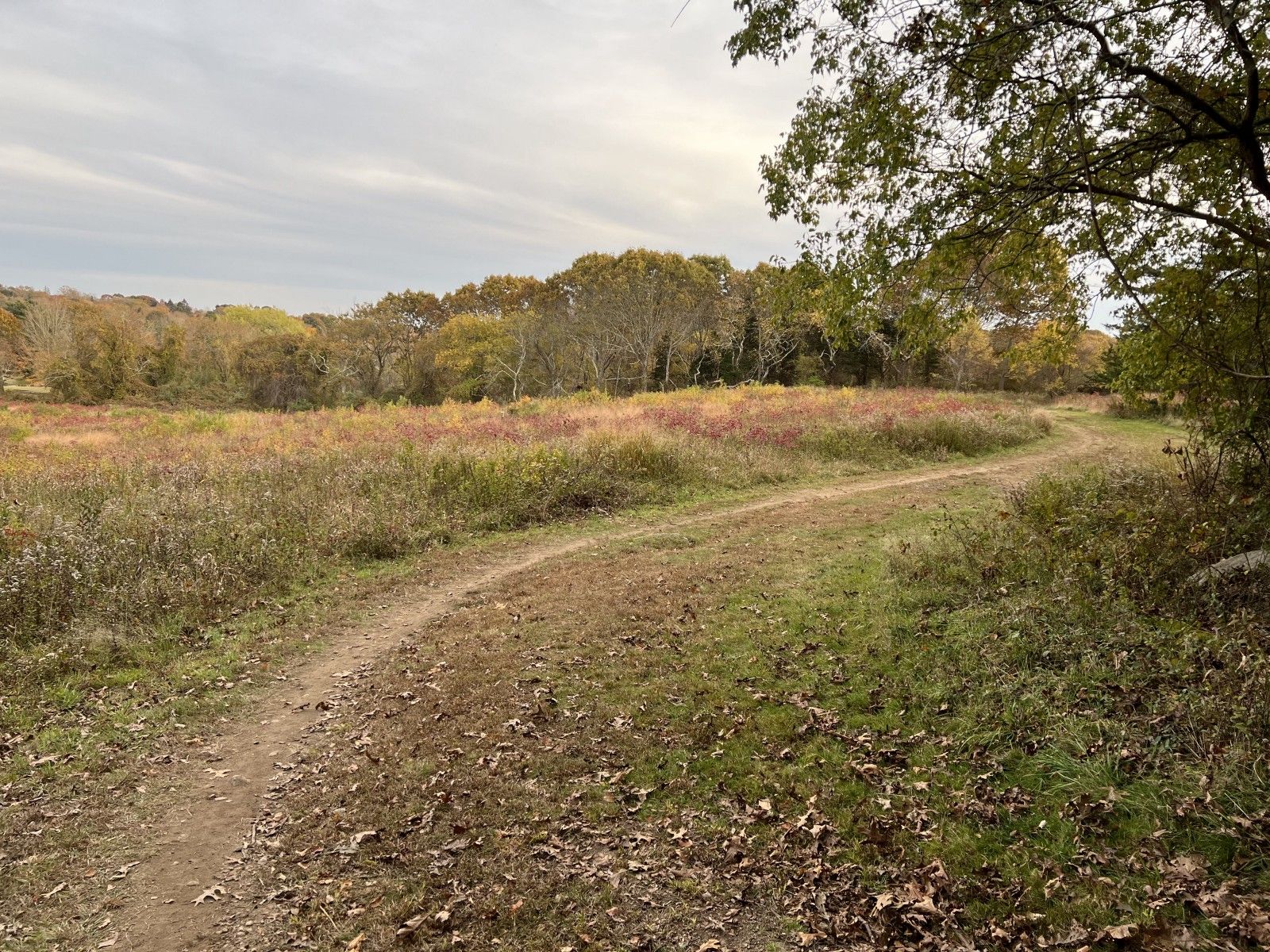Sermon: Abandoning the Self
Published by Ronald Steed,
ST ANDREW’S DAY | THE WAY
Sermon: Abandoning the Self
St. Andrews Episcopal Church, Madison, CT ¹

Taken from Matthew 4:18–22 (NRSV)
As Jesus walked by the Sea of Galilee, he saw two brothers, Simon, who is called Peter, and Andrew his brother, casting a net into the sea, for they were fishermen. And he said to them, "Follow me, and I will make you fish for people." Immediately they left their nets and followed him. As he went from there, he saw two other brothers, James son of Zebedee and his brother John, in the boat with their father Zebedee, mending their nets, and he called them. Immediately they left the boat and their father, and followed him.
We Know Nothing
We know almost nothing about Andrew. What is written about him in the Gospels is too sparse for meaningful thoughts about his character, and the supposed history of his post-Pentecost preaching, travels, and martyrdom was not written until more than 200 years after his death, which really calls its truth into question. Even his link to Scotland seems pretty thin, having more to do with the movement of some of his supposed remains.

So what to say about Andrew? Well, given that he is not only the Patron Saint of Scotland but also of Russia and Ukraine, we might imagine that whatever is going on upstairs in Andrew’s office, his staff would certainly seem to have their hands full these days!
Maybe, there are four things we can say about Andrew that might be close to the mark.
They Didn’t Get it
First, I think Andrew and all the apostles and disciples who followed Jesus before his crucifixion didn’t get what Jesus was about. What Jesus was doing was not what they thought he was up to. This is very clear in Mark’s gospel, but in the others also. And it’s easy to understand why. Israel was anticipating the Messiah to save them for a long time, and Jesus was neither the first nor the last to make that claim.

People believed that God’s anointed one would raise an army and crush the Roman oppressors and do it with God’s direct help and blessing. You can almost imagine Andrew walking along saying, "Yeah, great story about the Good Samaritan Jesus, but where are we supposed to get the weapons? And who will teach Peter how to use a sword? He’s a hazard to himself and others where sharp objects are concerned!" And, even though they didn’t understand Jesus, I think they loved him deeply… both were true.
Moral Injury
The second thing I think we can say is that Andrew, and all the other male Apostles, suffered moral injury when they abandoned Christ as he was being arrested. A moral injury is a type of trauma received when one acts on or witnesses events that run counter to deeply held moral convictions. So after following and loving Jesus for 3 years, to abandon him in the middle of his arrest had to hurt, particularly when that arrest led directly to crucifixion.
It would not surprise me if some of the Apostles, huddled in fear in the upper room after the crucifixion, blamed themselves for Jesus’ death. The gospels follow Peter’s particular injury, but certainly, all the men felt something similar for actions that departed so strongly from their deeply held beliefs about Jesus, even if those beliefs were fundamentally wrong. It was their love of Jesus that was the source of their traumatic moral injury.

It is not uncommon for veterans to suffer moral injuries in exactly this way, particularly those who have endured combat. It is one of the reasons why some veterans are reluctant to talk about their war experiences; what they were made to do in our name was sometimes unspeakable. It could make them feel deeply compromised as human beings.
These two aspects of Andrew’s experience, the fact that he didn’t understand Jesus, and the moral injury he likely suffered by abandoning Jesus in his hour of need, really give me a lot of comfort. If Apostles can do things like THIS and be forgiven… well, so might we. We might be getting Jesus all wrong… we wouldn’t be the first. We might be doing things we think are contrary to the Gospel, inviting moral injury… again, we’re not the only ones. If Andrew can be forgiven, and he certainly was, then we can too.
Troubled and Astonished
The third thing we might be able to say about Andrew and his fellow Apostles is the utter astonishment they must have felt starting on Easter morning.
First, with the report of Apostle Mary Madeline and the other female apostles about the empty tomb. Later, to their amazement, Jesus himself appeared in the locked upper room where they were all hiding from the authorities.
At some point afterward, Andrew witnessed Jesus disappear during the Ascension. And finally, 50 days after Easter, all of them experienced the incredible gift of the Holy Spirit at Pentecost.
In the Gospel of Thomas, a book not part of the New Testament canon but which might have been written as early as the first Gospel of Mark, Jesus says, "Let him who seeks not cease seeking until he finds. When he finds, he will become troubled. When he becomes troubled, he will be astonished, and he will reign over the all." I think Andrew and everyone else felt deeply troubled by all of this, and then…astonished.

With that complete astonishment, I think the Holy Spirit unified them with Christ and gave them the courage to come out of the locked upper room so that they could reign in the Kingdom of God.
I think that, with the help of the Spirit, they came to a much better understanding that the risen Christ was so much more than they thought the living Jesus was; cosmically more.
And, I think they came to an understanding that all of humanity was something far more than just the people of Israel; cosmically more! And that in Christ, the essence of humanity and the essence of God were made one. And that was good news for everyone… good news for everybody.
At some point, if their tradition is true, the twelve were ready to spread this astonishing Gospel as far and wide as they could, each taking on a different part of the known world. Andrew reportedly went to Greece and eventually to parts of Ukraine and Southern Russia. I think he never heard a highland bagpipe, I’m sorry to say!

Not Today’s Christianity, but "The Way"
And this brings the fourth thing we might be able to say about Andrew. I think the Christianity of Andrew was almost nothing like the Christianity of today. It wasn’t even called Christianity, but rather "The Way."
It did not have Bishops, Priests, and Deacons… no liturgical vestments, no organs or drum sets, and no church buildings. It did not have creeds or doctrines or New Testament scripture. And somehow, without all these things, people came to faith in Christ.
At its simplest, what passed for a creed might have been "Jesus is Lord", and its fundamental practice was love; "to love the Lord your God with all your heart, with all your soul, with all your mind, and with all your strength, and to love your neighbor as yourself".
Maybe there was a simple Eucharist as a practice of mutual love and oneness in Christ. And Andrew’s Christianity had stories… stories about Jesus and stories that Jesus told. My sense is that The Way of Andrew’s day was more about the practice of love than about belief. "See how they love one another" might have been the symbol of Christian practice.
I’m pointing all this out, not to suggest that we need to throw our own practices away, but rather to show the strength and nibleness of the Holy Spirit. She has worked on Christians who have all OUR current practices and many others, and she has worked on Christians who had hardly ANY practices at all. As we navigate ahead through changing times, we might take comfort in all that… Christ is fully capable of shepherding us, no matter what.
Abandoning the Self
So what WAS the experience of Andrew?
A friend of mine sent me this; "There are so many variables in life over which we have little if any control. Rather than seeing life as a series of obstacles, frustrations, and impenetrable questions, we could instead see life as an endless stream of invitations to cooperate with whatever God is up to and to abandon ourselves into God’s hands and God’s time." ²
I think this sums up nicely the experience of Andrew and the other Apostles. After everything, they gave up control as an illusion… stopped worrying about obstacles, frustrations, and impenetrable questions.
Rather, they abandoned themselves into God’s hands and God’s time. I think they were full of the Holy Spirit who helped them to see the endless streams of invitations to join what God was up to in Jesus Christ.

Each Apostle followed a different path, each confident that there was nowhere they could go where Christ was not already there at work ahead of them; nowhere they could be where they didn’t carry Christ burning in their hearts. They woke each day to become less and less like themselves and more and more like Christ. Andrew knew his oneness with Christ, a oneness we are all created to have.
May Andrew’s Way with Christ inform our way too. May we be assured that when we don’t get it right about Jesus, we’ll be OK. If we suffer moral injury along The Way, we’ll be OK. May we be troubled by Christ, and astonished by Christ. May we remember that the The Way is about Love at its core, and may we grow less and less like ourselves, and more and more like Christ, every day. Amen.
...
- Sermon delivered at St. Andrews Episcopal Church, Madison, CT on Sunday, November 13, 2022; St Andrew’s Day (transferred early from Nov 30)
- Sent to me courtesy of The Rev Lynda Tyson; Almquist, B. C. (2020, April 21). Waiting on God — Br. Curtis Almquist, Society of St John the Evangelist, Boston. Retrieved November 10, 2022, from https://www.ssje.org/2018/10/02/waiting-on-god-br-curtis-almquist/
If this resonated, there are more!
The Rev. Ron Steed is an Episcopal Deacon in Southeast Connecticut and has served the New London Homeless Hospitality Center in a variety of ways. He writes haiku and lyrical prose that he hopes will help others put the head and heart in right-relation.

Ron Steed